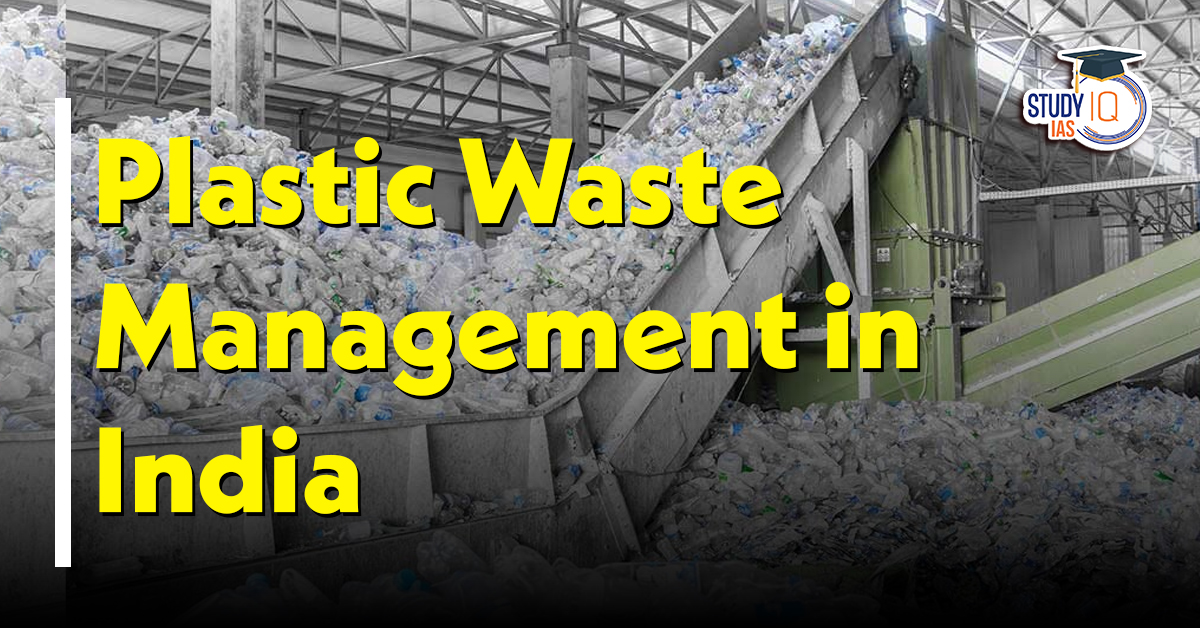Table of Contents
Context: Judicial intervention, like continuing mandamus and the polluter pays principle, could be the solution to combat India’s giant waste management problem.
Plastic Crisis in India
- India is now the world’s biggest plastic polluter, releasing approximately 3 million tonnes (Mt) of plastic waste annually, accounting for one-fifth of global plastic emissions, according to a Nature study.
- This includes both plastic debris and emissions from open plastic burning.
- Much of this plastic transitions from managed or mismanaged systems into unmanaged environments, causing severe environmental degradation.
Also Read: Plastic Pollution
Problems Associated with the Plastic Crisis
- Underestimation of Waste: Official data reports 12 kg/capita/day, whereas the actual figure may be 0.54 kg/capita/day.
- Rural waste, informal sector recycling, and open burning often go unreported.
- Inadequate Infrastructure: India’s dumpsites outnumber sanitary landfills by 10:1.
- Many regions, especially the Indian Himalayan Region, lack data and the capacity to handle waste.
- Lack of Transparency and Audits: No clear methodology for how waste data is collected.
- Waste audits, if any, are not in the public domain.
- Weak Local Governance: Rural areas under panchayati raj institutions often lack waste management facilities.
- Many urban local bodies are not connected to Material Recovery Facilities (MRFs), EPR kiosks, or sanitary landfills.
- Non-Compliance with Environmental Norms: Even where rules exist, enforcement is weak.
- Plans often remain on paper without meaningful implementation.
Also Read: Global Plastic Treaty
Role of the Judiciary
- Constitutional Duty: The Supreme Court views environmental protection as a constitutional obligation tied to fundamental rights and ecological balance.
- Use of Continuing Mandamus: In cases like the Vellore tanneries, the Court ordered ongoing oversight and compliance through a committee, ensuring real-time implementation.
|
Fact |
|||||||||||||||||||||
In January 2025, the Supreme Court issued a continuing mandamus to ensure compliance with earlier environmental directives for the Vellore tanneries. It:
Mandamus
|
|||||||||||||||||||||
- Polluter Pays Principle: Courts have reinforced that polluters must not only compensate victims but also pay for ecological restoration.
- Government Pay Principle: If polluters can’t pay immediately, the government must compensate victims and recover from polluters later.
- Accountability for Non-Compliance: Courts have emphasised the need for time-bound compliance and action against non-implementing authorities.
Way Forward: Solutions
- Reliable, Disaggregated Data: Mandatory waste audits and transparent methodologies must be put in the public domain.
- Inclusion of rural and informal sector data is critical.
- Geotagging Waste Infrastructure: Track infrastructure like MRFs, recyclers, landfills through geospatial tools.
- Strengthen Local Governance: Ensure all urban and rural bodies are connected to recovery and recycling systems.
- Enable capacity building at the panchayat level.
- Operationalize Extended Producer Responsibility (EPR): Set up kiosks by PIBOs (Producers, Importers, Brand Owners) in all areas for waste collection and segregation.
- Link waste collection targets with actual recovery.
- Judicial Oversight: Apply continuing mandamus in key waste management cases.
- Empower courts to monitor compliance and ensure justice to affected communities.
- Use of Technology: Leverage India’s IT and GIS capabilities to create real-time monitoring platforms for waste generation and management.


 World Wetlands Day 2026: Theme, History,...
World Wetlands Day 2026: Theme, History,...
 Geological Heritage Sites of India: Sign...
Geological Heritage Sites of India: Sign...
 Wildlife Sanctuaries of India 2026: List...
Wildlife Sanctuaries of India 2026: List...




















